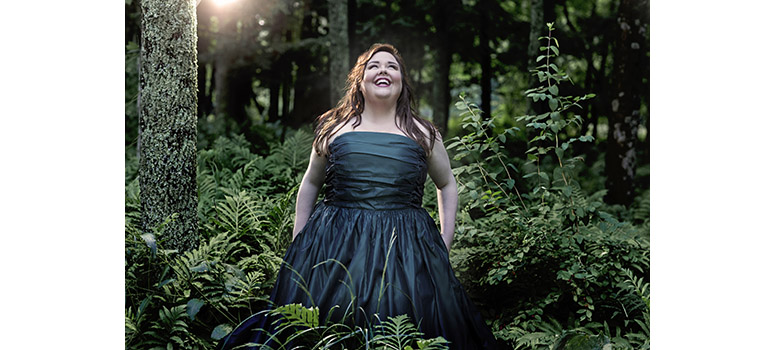If most ferry riders are able to attend only one performance of San Francisco Opera's summer season, our pick is Rusalka, which is about a water nymph inspired by the Hans Christian Andersen story The Little Mermaid.

Jamie Barton plays Jezibaba in the San Francisco Opera’s performance of Rusalka. Photo by Fay Fox
BY PAUL DUCLOS
Published: June, 2019
If most ferry riders are able to attend only one performance of San Francisco Opera’s summer season, our pick is Rusalka, which is about a water nymph inspired by the Hans Christian Andersen story The Little Mermaid. And while readers might already know the opera’s signature aria, “Song to the Moon,” they may be less acquainted with the show’s outstanding diva, Jamie Barton, who plays Jezibaba.
Heather MacDonald, a critic with City Journal, noted in her review of a recent performance at the Met that “Barton’s massive mezzo erupts like a foghorn at unexpected moments; at other times it slides sinuously around Dvořák’s curvaceous folk melodies.”
In this exclusive interview, Barton shares her views on a wide variety of interests shared by the Bay Area ferry community.
Bay Crossings: Your performances as Jezibaba have been described in the New York Observer as containing “sheer malevolence.” How do you prepare for this passionate role?
Jamie Barton: It’s always about getting in the head of the character you’re playing—given that Jezibaba is some variation on a psychopath, she presents a challenge! Jezibaba changes the tone of what she’s saying on a dime, and is very often absolutely gleeful about the violence and chaos she’s creating. Capturing that complexity requires a lot of character work in advance, and then I have to just let go and be as organic and playful as possible onstage.
BC: Does being a mezzo-soprano lend itself to a darker shading of the role?
Barton: Absolutely! While this role calls for the singer to soar through the heights of the mezzo range, you also have to be able to bellow lower notes in a manner that would intimidate anyone standing nearby—that’s where that darker shade really comes in handy. My mezzo range and vocal color palette definitely help me portray Jezibaba as both sinister and unpredictable.
BC: So, you are here in San Francisco. Do you feel that the bright sunlight and proximity to Bay and sea might diminish that intensity you bring to your performance?
Barton: Absolutely not—the beautiful nature of San Francisco always feeds my soul, and that inherently influences my performance in a positive way!
BC: Before and after singing, how do you unwind in San Francisco?
Barton: Getting out of a show is like getting off of work for most any job, except that we often have an awful lot of adrenaline coursing through our bodies! Most of the time I just have to wait for that adrenaline to die down. It’s rare that I can go to sleep soon after a show, so I just focus on relaxing and letting my body and mind come down naturally. Sometimes I go out to late dinner or drinks with colleagues or friends in the area. But most of the time I just go home, make a cup of tea, snuggle with my kitty, River, and stream something brainless and fun.
BC: Can you describe how you interact with the conductor and the orchestra at SFO?
Barton: The cast works for several weeks with just the director and conductor in the beginning of a rehearsal process. The orchestra isn’t added into our rehearsal schedule until about a week and a half before opening night. Adding the orchestra always changes how I experience shows—in any score, the orchestra is really its own character. As brilliant as the musicians playing piano in rehearsals often are, nothing compares to the feeling of an orchestra underneath you. So, the interaction between the conductor, orchestra and singers is a very tricky balancing act for each of those elements. For the performers, that means really listening to each other, and trying to follow the conductor—or be very clear about your performance, if the conductor has given you the control. It’s a lot of teamwork, and a lot of trust. It’s honestly one of the hardest elements, and also one of the factors that makes me love this “team sport” as much as I do.
BC: Finally, what is your impression of the SFO audiences? Are we a tough crowd to please?
I think Bay Area audiences are the best sort: intelligent, curious, discerning and adventurous. I really respect an audience that is willing to go on a unique journey, and I find that San Francisco audience members tend to be not only up to the challenge of an inventive production, but also supportive and enthusiastic about all of the people who make the onstage magic happen. One of my favorite interactions with the SFO audience was being on stage for the final bow at the end of Götterdämmerung last summer during the Ring cycle. Everyone bowed onstage—singers, actors, orchestra, stagehands, everyone—and the audience was right there with us. It was like we were all sharing in this extraordinary experience of having completed a full Ring cycle, and the audience was celebrating with us. That’ll stay in my memory for a long time.

